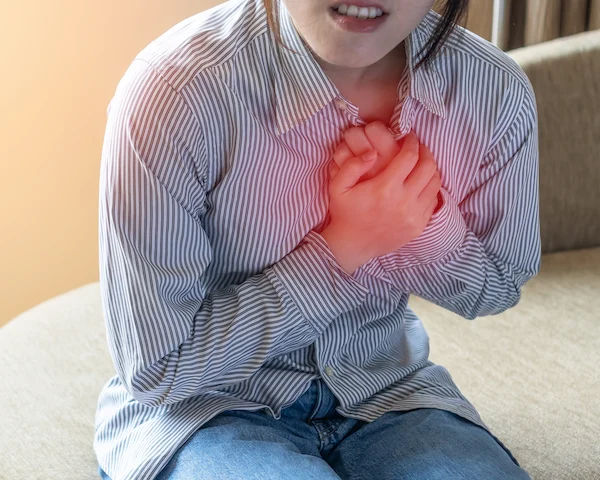Atrial Fibrillation: Causes and Symptoms
Learn about atrial fibrillation, its causes, and common symptoms. Understand this heart rhythm disorder to support early detection and better heart health.

Written by Dr. Vasanthasree Nair
Reviewed by Dr. Dhankecha Mayank Dineshbhai MBBS
Last updated on 13th Jan, 2026

Introduction
Have you ever felt your heart suddenly flutter, pound, or race like a drum in your chest? While occasional palpitations are common, persistent irregular heartbeats could signal a condition known as atrial fibrillation, or AFib. This common but serious heart rhythm disorder affects millions worldwide and significantly increases the risk of stroke and heart failure. But what exactly leads to these unsettling signs of atrial fibrillation? Understanding the root causes, from underlying heart disease and high blood pressure to lifestyle factors like caffeine and stress, is the first step toward effective management and prevention. This article will demystify the triggers of AFib, explore its common and subtle symptoms, and guide you on when to seek professional medical advice. Let's unravel the reasons behind your heart's irregular rhythm.
What is Atrial Fibrillation (AFib)?
Atrial fibrillation is a type of cardiac arrhythmia characterised by rapid and disorganised electrical signals in the heart's two upper chambers, the atria. This causes the atria to quiver (fibrillate) instead of contracting effectively. The result is an irregular and often rapid heart rate that can lead to poor blood flow to the ventricles and the rest of the body. This malfunction in the heart's electrical system is what produces the classic signs of atrial fibrillation that patients feel, such as palpitations and shortness of breath.
The Electrical System of the Heart vs. AFib
In a healthy heart, a natural pacemaker called the sinoatrial (SA) node sends organised electrical impulses that cause the atria to contract and push blood into the lower chambers (ventricles). In AFib, these impulses are hijacked by chaotic signals, primarily originating from the pulmonary veins, leading to the atria quivering at a rate of 300 to 600 beats per minute. The AV node, acting as a gatekeeper, blocks most of these signals, but enough gets through to cause a fast and irregular ventricular rate of 80 to 170 beats per minute.
Consult a Cardiologist for the best advice
The Primary Culprits: Common Causes of Atrial Fibrillation
The common causes of AFib include:
1. Underlying Heart Conditions
Most often, the signs of atrial fibrillation are a consequence of an existing heart problem. These conditions change the structure or electrical properties of the heart, creating a fertile ground for AFib to develop.
High Blood Pressure (Hypertension)
Hypertension is the most common predisposing condition for AFib. Chronically high blood pressure forces the heart to work harder, which can cause the left atrium to enlarge and stiffen over time. This enlargement, known as left atrial enlargement, alters the electrical pathways and promotes the erratic signals that characterize AFib. Managing blood pressure is a critical step in AFib prevention.
Coronary Artery Disease and Heart Attacks
Coronary artery disease (CAD), where the heart's arteries are narrowed by plaque buildup, can reduce blood flow to the heart muscle. A heart attack occurs when this flow is completely blocked, damaging heart tissue. This damage can include the areas that conduct electrical impulses, leading to scar tissue that disrupts the heart's rhythm and triggers atrial fibrillation episodes.
Structural Heart Defects
Any abnormality in the heart's structure can lead to AFib. This includes:
Congenital Heart Defects: Present from birth, such as atrial septal defects.
Heart Valve Problems: Especially mitral valve stenosis or regurgitation, which place extra stress on the atria.
Cardiomyopathy: Diseases of the heart muscle that make it harder for the heart to pump blood.
2. Lifestyle and Environmental Triggers
Not all causes are rooted in disease; daily habits play a massive role in triggering AFib episodes, especially in susceptible individuals.
Alcohol and "Holiday Heart Syndrome"
The term "Holiday Heart Syndrome" was coined to describe the onset of AFib in otherwise healthy people after a weekend or holiday of heavy alcohol consumption. Alcohol is a direct toxin to heart muscle cells and can alter the electrolytes and hormones that influence heart rhythm. Even moderate drinking can be a trigger for some people.
Stimulants: Caffeine, Nicotine, and Drugs
Stimulants can jumpstart the nervous system and trigger AFib. While the link between moderate caffeine (coffee, tea) and AFib is weak and debated, excessive intake or high-concentration energy drinks are known triggers. Nicotine from smoking and illicit drugs like amphetamines and cocaine are potent stimulants that significantly increase the risk of sudden AFib onset.
Stress and Anxiety
Emotional stress and anxiety flood the body with adrenaline and cortisol, hormones that can accelerate the heart rate and provoke arrhythmias. For many, a sudden stressful event is a direct precursor to their first noticeable episode of atrial fibrillation. Learning stress management techniques is a key part of controlling paroxysmal AFib.
3. Other Medical Conditions
The heart doesn't operate in a vacuum. Several non-cardiac conditions can increase the risk of developing AFib.
Sleep Apnoea
Obstructive sleep apnoea (OSA), where breathing repeatedly stops and starts during sleep, is a major and often underdiagnosed contributor to AFib. OSA causes drops in blood oxygen levels, increases blood pressure, strains the heart, and creates an imbalance in the nervous system, all of which can trigger arrhythmias.
Thyroid Disorders (Hyperthyroidism)
An overactive thyroid gland (hyperthyroidism) produces an excess of thyroid hormone. This hormone acts as a natural stimulant, speeding up the body's metabolism and, consequently, the heart rate. This can overwhelm the heart's electrical system and lead to persistent atrial fibrillation. A simple blood test to check thyroid levels is standard in any AFib workup.
Diabetes and Obesity
Diabetes, especially when poorly controlled, can cause damage to the nerves and blood vessels that supply the heart. Obesity is linked to inflammation, sleep apnoea, and increased pressure on the heart, all of which are independent risk factors for the development of AFib. Weight loss has been shown to significantly reduce the burden of AFib.
4. Non-Modifiable Risk Factors
Some factors are beyond our control, but knowing them helps us be more vigilant.
Age
The risk of developing atrial fibrillation increases dramatically with age. As we get older, the heart's electrical system can naturally degenerate, and the atria may undergo age-related fibrosis (stiffening). The majority of people with AFib are over the age of 65.
Family History and Genetics
If you have a close family member with AFib, your risk is higher. Research has identified specific genetic mutations associated with a predisposition to the condition, though these are not the sole cause for most people.
Recognizing the Signs: When to Seek Help
Know the common symptoms of AFib and when to consult a doctor:
Common Symptoms of an AFib Episode
The signs of atrial fibrillation can vary. Some people have pronounced symptoms, while others feel nothing at all (a condition called silent AFib). Common symptoms include:
Heart Palpitations: A feeling of a racing, fluttering, or pounding heartbeat.
Fatigue and Weakness: Due to the heart's inefficient pumping.
Dizziness or Lightheadedness: Caused by reduced blood flow to the brain.
Shortness of Breath: Especially during exertion or even at rest.
Chest Pain or Pressure: This requires immediate medical attention.
If you experience chest pain, severe shortness of breath, or fainting, seek emergency care immediately, as these could signal a heart attack or severe complication.
The Danger of Silent AFib and Stroke Risk
The most dangerous aspect of AFib is its ability to cause blood clots. When the atria quiver instead of contract, blood can pool and clot in the heart. If a clot breaks free, it can travel to the brain and cause an ischemic stroke. AFib increases stroke risk fivefold.
Conclusion: Taking Control of Your Heart Health
The signs of atrial fibrillation are a powerful message from your body that something is amiss with its rhythm. While some risk factors like age and genetics are beyond our control, many of the primary drivers, such as hypertension, obesity, sleep apnoea, and lifestyle choices, are manageable. Recognising the connection between these triggers and your symptoms is the cornerstone of effective AFib management. If you identify with any of the causes or symptoms discussed, it is crucial not to ignore them. Early diagnosis and intervention can help control your heart rate, restore rhythm, and, most importantly, drastically reduce your risk of stroke. Proactive heart health, through regular check-ups and lifestyle modifications, is your best defense. If symptoms persist beyond two weeks, consult a doctor online with Apollo24|7 for further evaluation. Taking action today can ensure your heart keeps a steady beat for years to come.
Consult a Cardiologist for the best advice
Consult a Cardiologist for the best advice

Dr. Zulkarnain
General Physician
2 Years • MBBS, PGDM, FFM
Bengaluru
PRESTIGE SHANTHINIKETAN - SOCIETY CLINIC, Bengaluru

Dr. Anand Ravi
General Physician
2 Years • MBBS
Bengaluru
PRESTIGE SHANTHINIKETAN - SOCIETY CLINIC, Bengaluru

Dr. Tripti Deb
Cardiologist
40 Years • MBBS, MD, DM, FACC, FESC
Hyderabad
Apollo Hospitals Jubilee Hills, Hyderabad

Dr. E Prabhakar Sastry
General Physician/ Internal Medicine Specialist
40 Years • MD(Internal Medicine)
Manikonda Jagir
Apollo Clinic, Manikonda, Manikonda Jagir
(150+ Patients)

Dr Gautam Naik
Cardiologist
12 Years • Senior ConsultMBBS, MD (General Medicine), DM (Cardiology), Interventional Cardiology Fellowship (Royal Papworth Hospital, Cambridge, UK), Structural Heart Intervention Fellowship (Barts Heart Centre, St Bartholomew's Hospital, London)
Delhi
Apollo Hospitals Indraprastha, Delhi
(50+ Patients)
More articles from Atrial Fibrillation and Stroke
Frequently Asked Questions
1. Can dehydration cause atrial fibrillation?
Yes, dehydration can be a trigger. It can lead to electrolyte imbalances and lower blood pressure, which may stress the heart and provoke an AFib episode, especially in hot weather or after intense exercise.
2. What is the difference between atrial fibrillation and atrial flutter?
Both are arrhythmias affecting the atria. In atrial flutter, the electrical signals are rapid but organised, producing a sawtooth pattern on an ECG and a more consistent heart rate. In AFib, the signals are chaotic and disorganised, resulting in a completely irregular rhythm.
3. Can atrial fibrillation be cured?
While some cases, especially those triggered by a reversible condition like hyperthyroidism, can be resolved by treating the underlying issue, AFib is often a chronic condition. However, it can be effectively managed with medications, procedures like ablation, and lifestyle changes to control symptoms and prevent complications.
4. Is exercise safe if I have atrial fibrillation?
For most people, yes. Regular, moderate exercise is beneficial for heart health and can help manage AFib triggers like obesity and high blood pressure. However, it's essential to get clearance from your cardiologist, as they may recommend specific limits or precautions based on your individual condition.
5. What does an AFib episode feel like?
People describe it in various ways: a fluttering or 'butterflies' in the chest, a feeling that the heart is 'flip-flopping,' a pounding pulse, or a sudden racing heart that feels out of control. Some also experience anxiety, sweating, and shortness of breath during an episode.
